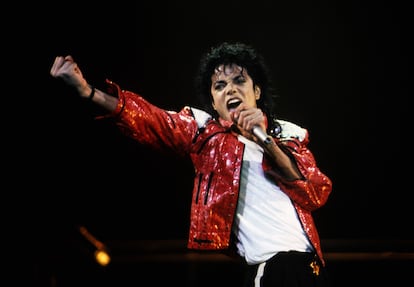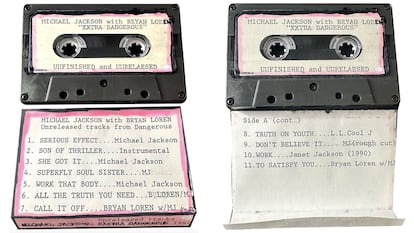Dispute between auction house and heirs leaves future of 12 previously unreleased Michael Jackson tracks unclear
Cassette tapes found in December will likely go for upwards of $100,000 — but their buyer won’t be able to play them in public


Just like a B-grade TV detective show, it all began with a retired cop opening the door of an abandoned storage room. It happened in December, when 56-year-old former highway patrol officer Gregg Musgrove visited a storage space that his business associate had just bought in Van Nuys, a northern Los Angeles neighborhood. He had gone to check out its contents, to see if it held some hidden treasure. And oh, but it did. Musgrove came face to face with a thrifter’s fantasy: objects that had belonged to Michael Jackson himself. The icing on the cake was a handful of cassette tapes with a dozen unreleased songs by the singer, who died in 2009. The retired law enforcement agent told industry press about his trip to the storage room, which had belonged to music producer Bryan Loren, and word of the tapes, which date from between 1989 and 1991, made the news. Now the plot has thickened, with a dispute over the tracks that could end up in court.
The tapes that were found in the abandoned San Fernando storage space are now at the center of a million-dollar sale. A New Jersey-based auction house specializing in music named Gotta Have Rock and Roll put three of the cassettes up for sale on February 19. The starting bid was set at $85,000, but the winning offer is expected to reach $100,000 or $150,000 or even $200,000. The catch is that whoever lands the tapes will be required to have nothing but a collector’s relationship with them, because reproducing the music they contain is prohibited. “There is enormous interest, Michael Jackson fans are wild for his souvenirs. They’d kill for unreleased material. Whoever gets these will be very lucky and happy,” the president of the auction house tells EL PAÍS. But is it worth spending upwards of a hundred grand on music no one else can listen to?
Technically, the tapes can’t be heard by the public, which is to say that their owner will have to press play on them in private. They can’t be broadcast on the radio, for example, nor heard on a massive scale. The auction house’s website puts it like this: “We emphasize this collection is being sold as an artifact ONLY. There is no copyright to any of the songs/materials on the cassettes in this lot. Reproduction of any content on these cassettes is strictly prohibited, and the winning bidder is buying this solely as an artifact in the form of three separate cassettes.” This fervent insistence comes directly from Jackson’s heirs, who are in disagreement with the tapes being auctioned at all.

According to TMZ, the managers of the pop star’s estate say that the tapes are actually copies of masters that are in their possession. Since the originals belong to them, as well as the rights to their public reproduction, that makes it illegal for the owner of these copies in this “long-outdated format,” as they somewhat disparagingly called the tapes, to reproduce them. Not only would they have to have the right device to play them, but also permission from the estate. Should the recordings be broadcast or otherwise leaked, it could constitute an intellectual property crime, and become a legal matter.
The heirs’ statement doesn’t seem to have spooked Gotta Have Rock and Roll, which seems nonplussed by potential legal consequences of the tapes’ sale. In fact, the house’s president Dylan Kosinski says that the old tapes are even more attractive because they require private enjoyment. In his opinion, the fact that the Jackson heirs are so jealously guarding the originals makes the tapes even more valuable. The fact that they’ve recognized the copies effectively confirms that the material is authentic and unreleased. Not to mention, the estate has the right to release the tracks posthumously (as it did other previously unheard songs in 2010), in which case the owner of the tapes will have been the first to gain access to the content.

In a statement to EL PAÍS, Kosinski says that he respects the Jackson estate “to the maximum”: “I think they are acting cautiously because they don’t want anyone to make these songs public,” the auction house representative reflects via email. “I understand that perfectly and I respect it. We make it clear that whoever buys the artifact will not be able to reproduce, distribute or disseminate the contents of the tapes. That said, it’s an incredible artifact that we are going to auction.”
The tapes will be placed for bid along with a photograph of Jackson signed by the artist, and include the songs 7 Digits, of which fans have long been aware, although the track has never been released, in an early and very long version that lasts nearly 16 minutes. In fact, the first part of the song appears on side A of the tape, and it continues onto side B. Other tracks have never been released or leaked, like Serious Effect, Call It Off, All The Truth You Need and Don’t Believe It. Pieces of the tapes’ other songs have been heard by the public, like She Got It and Work, with Janet Jackson. A third cassette features a very short version, at just 15 seconds, of the classic song San Francisco, sung a capella by Jackson.
The star’s enormous legacy is managed by a foundation. Although he died with millions of dollars of debt, including money that was owed to the IRS — court documents released last summer estimate the total sum to have been around $500 million — as time has passed, Jackson’s has become one of the wealthiest estates in the music industry. Even so, neither his mother nor children have the ability to sell off his assets: 28-year-old Prince, 26-year-old Paris, 22-year-old Bigi and the singer’s mother, 94-year-old Katherine Jackson, have to wait until their executor and the IRS resolve a years-old dispute over the estate’s value.
Sign up for our weekly newsletter to get more English-language news coverage from EL PAÍS USA Edition
Tu suscripción se está usando en otro dispositivo
¿Quieres añadir otro usuario a tu suscripción?
Si continúas leyendo en este dispositivo, no se podrá leer en el otro.
FlechaTu suscripción se está usando en otro dispositivo y solo puedes acceder a EL PAÍS desde un dispositivo a la vez.
Si quieres compartir tu cuenta, cambia tu suscripción a la modalidad Premium, así podrás añadir otro usuario. Cada uno accederá con su propia cuenta de email, lo que os permitirá personalizar vuestra experiencia en EL PAÍS.
¿Tienes una suscripción de empresa? Accede aquí para contratar más cuentas.
En el caso de no saber quién está usando tu cuenta, te recomendamos cambiar tu contraseña aquí.
Si decides continuar compartiendo tu cuenta, este mensaje se mostrará en tu dispositivo y en el de la otra persona que está usando tu cuenta de forma indefinida, afectando a tu experiencia de lectura. Puedes consultar aquí los términos y condiciones de la suscripción digital.








































